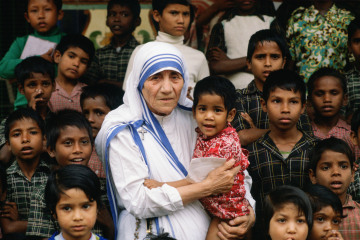Mother Teresa once said, “If I look at the mass, I will never act. If I look at the one, I will.” Recently, these words began to make more sense to me. At a surface level, it seems easy to understand that she is speaking about the discouragement all of us face at the overwhelming problems of the world, and how if we only limit our vision to one person suffering, we can make a difference in the world. This is a fair interpretation, but what if she is talking about something a little bit more profound and personal? What if she is pointing to a truth which is only learned through solidarity with the oppressed, or more specifically, someone who is oppressed?
We are now on day 18 of 25 in Change, and this week we focused on the need to empathize. In fact, all the curriculum of 25 in Change (Self-examination, education, empathy, equipping, and measuring effect) is meant to help us be more effective at empathizing with those who are marginalized.
This is how it works: 25 in Change teaches people how to empathize, by building a community which values empathy, and for this reason it is a virtuous circle. By building an empathic community–which values empathy through self-denial–so that others are helped, we begin a conversation about the value of empathizing with others, and through this we learn how to empathize with others, which in turn reinforces our bonds of community built on the value of empathy. So the cycle continues. It’s like a gift which keeps on giving. And if someone has an easier way of talking this cycle, we’re all ears.
Empathy is at its greatest when people are not seen as objects to be pitied but instead as people sharing in our own fate. Empathy always breaks down barriers, and the greatest barrier to be overcome is the false notion of individualism and autonomy. Martin Luther King Jr. once said, “all mankind is tied together; all life is interrelated, and we are all caught in an inescapable network of mutuality, tied in a single garment of destiny. Whatever affects one directly, affects all indirectly. For some strange reason I can never be what I ought to be until you are what you ought to be.” Dr. King points out that our personal destiny is tied to our moral responsibility to one another, and no matter how great we are at something, we can never be the fullest expressions of ourselves if we do not take into account our shared existence with others.
The process of empathy begins with imagining ourselves in another person’s shoes, it is then strengthened in recognizing ourselves in the face of another, and finally culminated in the reflection of ourselves in their eyes.
The empathic process draws us out of ourselves, and immerses us in our own world. It allows us to step outside of ourselves, in order to actually be ourselves. Jesus points to this paradox in Matthew 10:39 “Whoever finds his life will lose it, and whoever loses his life for my sake will find it”. But not only do we need to lose ourselves in Jesus, but in each other as well. In Matthew 25:31-46, Jesus talks about the need for empathy in order to be saved, and that serving those who are marginalized is the same as serving him. Why? Because empathy shows us that he is expressed in the face of another. Not only do we find Jesus in those who are marginalized, we also find ourselves through our shared existence.
At the end of his life, the disciple John had grown so weak from old age that he needed help in moving around, and was carried by his disciples back and forth to the church where he would occasionally speak. Because he was so weak that he could barely speak, he would often only say a certain statement over and over again. In fact, he said it so often, that he became known for only saying it, and nothing else. To his disciples he would constantly say, “Little children, love one another”. Having said it so often, his disciples one day decided to press him on it, and asked him about it. Why, of all the things he had seen and learned, was this statement so crucial to keep repeating? To them he replied “It is the Lord’s command, and if alone this be done, it is enough.”
To all churches who feel like they aren’t doing enough for their members, and who decide to go the extra mile through dynamic preachers, studio quality worship bands, high quality sound systems, and structured church services to prevent dead air and downtime, let me repeat the disciple John’s words to his disciples, “Little children, love one another,” because “it is the Lord’s command, and if alone this be done, it is enough.”
25 in Change is a revolution of empathy to give the church back to itself. We are only the church when we empathize with those who suffer. James, the brother of Jesus, said in James 1:27, “True religion is taking care of widows and orphans in their distress, and to keep ourselves from being screwed up by the world.” We are 18 days into 25 in Change at Pathways Church, and we are experiencing a revolution which is changing the culture of our church. 25 in Change is the result of the revolution and is fanning the flames of personal change and empathy, and kicking it up to a whole new level.
If you agree with us that the church needs to change in order to find itself again, like Mother Teresa, begin with the one. And let that one be you. Join 25 in Change and become the change of a world revolution.

